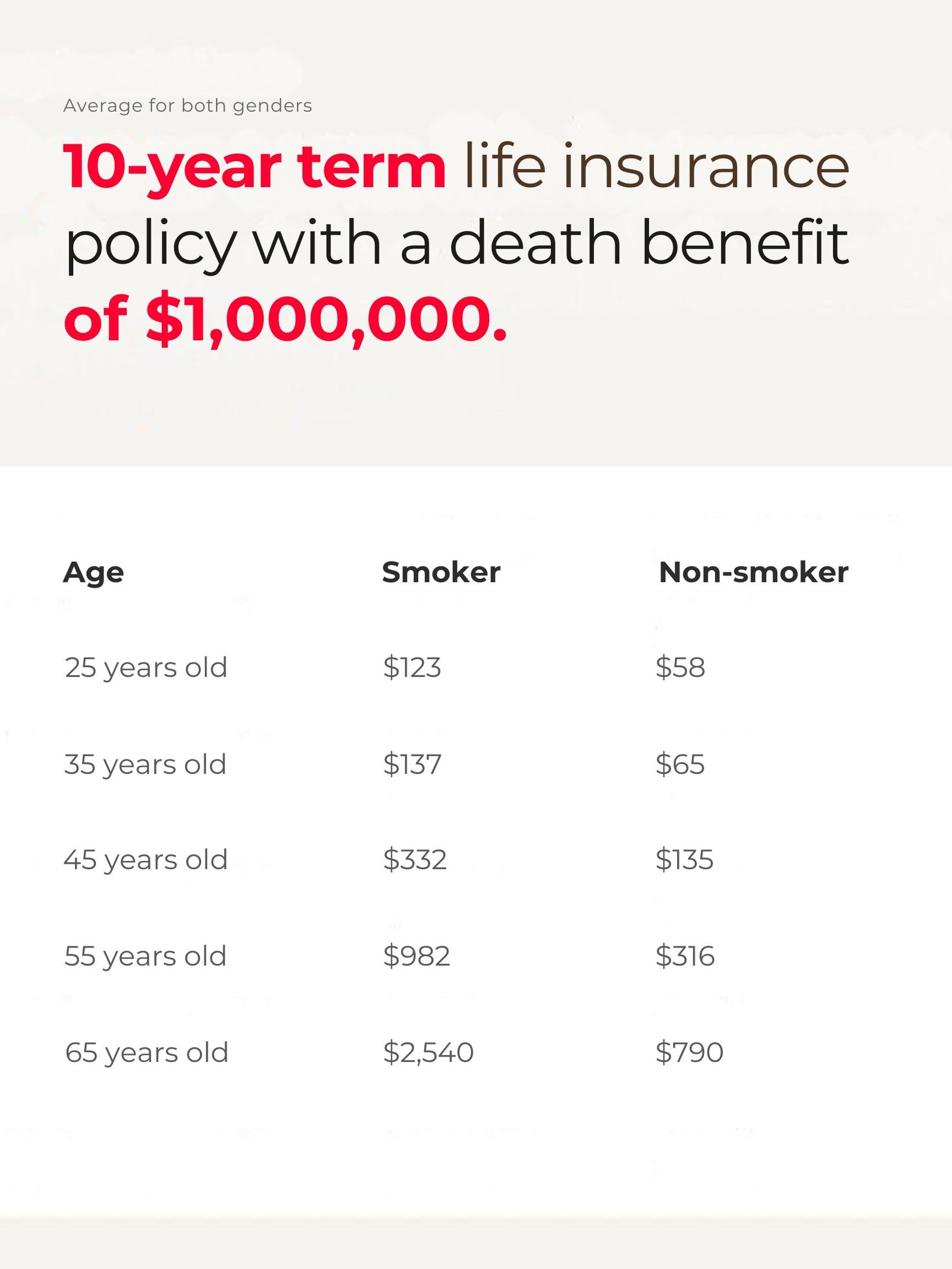Secure Your Lowest Life Insurance Rate Today
As time goes on, life insurance rates tend to go up. By choosing to invest in a policy now, you’re ensuring that you lock in the most affordable premium, saving you money in the long run.


A Smart Strategy to Save on Life Insurance
Getting life insurance early on is a wise move, setting you up for the best possible rates. On average, life insurance costs can rise by 8% with each year you wait. But once you’ve signed your policy, your rate is fixed and won’t change for the duration of the policy’s term.
Real World Scenario
Life Insurance Rates: A Look at the Numbers by Age As you get older, life insurance tends to get more expensive. We’ve put together a chart based on our policies to show how premiums change across different age groups. The quotes here represent a 10-year term life insurance policy with a $1 million death benefit for applicants in good health. In this scenario, a 35-year-old non-smoker would pay around $65 per month, while a 45-year-old non-smoker would pay about $135 per month for the same policy. By choosing to get insured at 35 instead of 45, you could save around $840 annually throughout the policy.

Common mistakes people make when it comes to Life Insurance
Waiting Until Parenthood:
Delaying life insurance until you have children could mean missing out on years of lower premiums. Life insurance isn’t just for parents; it can cover personal debts, medical bills, your mortgage, lost income, and even funeral costs.
Your health is a major factor in determining your premium. Generally, the healthier you are, the less you pay. So, getting life insurance while you’re young and healthy can be a smart move. As you age, the risk of health issues increases, potentially leading to higher premiums and making it harder to get insured. Securing life insurance early helps safeguard you and your dependents against unforeseen changes.
Over-Reliance on Work Coverage:
While life insurance through your employer is a great perk, it often isn’t enough. These policies typically offer coverage equal to one or two times your annual salary, but experts suggest having coverage around ten times your salary. Plus, if your job situation changes (due to retirement, a layoff, or a job switch), you could lose that coverage. If that happens when you’re older or if you’ve developed a health condition, finding new coverage could be more expensive and challenging. Having your own policy ensures that you and your loved ones are protected, no matter what.




Personalized Protection with Denesha
Rest assured, you’re in good hands with Denesha. While we might not be one of the big players in the insurance world, we see that as our strength. We offer dependable coverage and have streamlined our application process to take just minutes, not weeks. With us, you’re not just a number; you’re a valued partner.
Why Choose Denesha? Here’s the Difference:
Always Here to Help: Our dedicated team is available Monday to Friday, 9 AM to 5:30 PM, ready to assist you. Whether you prefer to navigate your options independently or desire expert advice to find the perfect policy, we’re here for you.
Tailored Coverage Just for You: We offer a wide range of options ensuring you find coverage that fits your life like a glove.
Simple, Fast, and Hassle-Free: Our process is 100% online, incredibly straightforward, and requires no medical exams—just a few quick health questions, and you’re on your way to being covered.
What are the types of Life Insurance?
- What It Is: A policy that provides coverage for a set period, typically 10, 20, or 30 years.
- Who It’s For: Ideal for people who need significant coverage for specific financial commitments that will diminish over time, such as a mortgage or children’s education costs.
- What It Is: These policies provide lifelong coverage and feature an investment component where cash value accumulates.
- Who It’s For: Best suited for those seeking both lifelong protection and a means to accumulate tax-deferred savings.
- What It Is: Whole Life insurance is a type of permanent life insurance that offers guaranteed lifetime coverage, provided premiums are paid. One of the defining features is its cash value component, which grows at a guaranteed rate.
Who It’s For: This policy is particularly suited for those who desire a fixed premium and guaranteed growth of cash value. It’s a good fit if you’re looking for both a long-term financial safety net and a potential source of loans or cash withdrawals.
- What It Is: Universal Life insurance is another form of permanent life insurance, but it offers more flexibility than Whole Life insurance. You can adjust your premium payments and death benefits to some extent. It also has a cash value component, but the growth is tied to current interest rates or investment performance.
Who It’s For: This policy is ideal for those who want lifetime coverage but also desire some level of flexibility to adjust premiums and death benefits according to their changing financial situation.
- What It Is: Similar to universal life insurance but with the cash value portion earning interest based on the performance of a market index.
- Who It’s For: Suitable for those who want the potential for higher returns without the risks of direct investment in the market.
- What It Is: A permanent life insurance policy with an investment component that allows you to invest your cash value in various sub-accounts.
- Who It’s For: Those who are financially savvy and want to integrate their life insurance with an investment opportunity.
- What It Is: This is a more specialized, smaller coverage policy designed to cover funeral costs and other end-of-life expenses.
- Who It’s For: Generally targeted at seniors who wish to ensure that their families are not burdened with their end-of-life expenses.
Why Trust Denesha Insurance Agency for Your Family’s Protection?
At Denesha Insurance Agency, we get it. You’re not just looking for any insurance; you’re looking for peace of mind, financial stability, and a great investment for you and your loved ones.
We take pride in our smaller size because it means we can offer a level of personal attention and care that the big insurance companies just can’t match. When you call us, you’ll always be greeted by a live person, ready to assist you. You’re not just a policyholder; you’re a partner, and we’re dedicated to taking care of our partners.”
See what our clients say about us
More benefits, lower premiums.
Lynn Smith
Very Helpful and Responsive
August Lowe
Professional and Trustworthy
Brian Maddux
Trusted Insurance Guidance
Shelly Roberts
Frequently Asked Questions


- Age (Life insurance rates typically increase as you get older)
- Gender (female tends to be less expensive)
- Smoking (smoking increases premiums)
- Health (poor health can raise premiums)
- Lifestyle (risky activities can increase premiums)
- Family medical history (chronic illness in relatives can raise premiums)
- Driving record (good drivers save on premiums)
Yes, you can name multiple beneficiaries and even specify the percentage of the death benefit each should receive.
Generally, life insurance payouts are not subject to income tax, making them a tax-efficient way of passing wealth to the next generation or securing your family’s financial future.
The cash value in a permanent life insurance policy grows over time and can be used for loans, withdrawals, or even to pay premiums in some cases.
Most types of life insurance, especially Universal Life, offer some flexibility to adjust premiums and coverage amounts. However, modifications may be subject to underwriting and other fees.
Once a claim is filed and approved, beneficiaries usually receive the death benefit within 30 to 60 days.
Need me to facilitate this personally?
Schedule a free consultation with me, we can discuss your personal situation.


